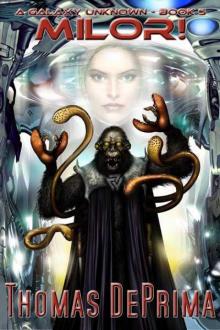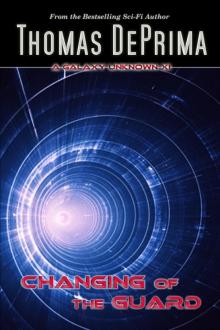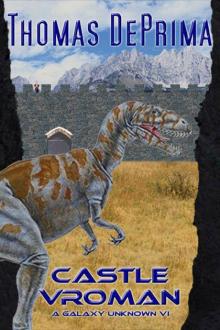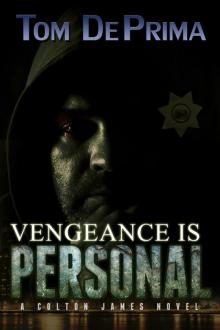- Home
- Thomas DePrima
When the Spirit Calls (When the Spirit... series - Book 2) Page 5
When the Spirit Calls (When the Spirit... series - Book 2) Read online
Page 5
"Now that was strange," Lt. Bolger said. "Gisela has always been a little— eccentric, but I've never seen her behave like that."
"Have you known her long?" Arlene asked, shaking her hand to relieve the pain and return the circulation quicker.
"Most of my life. We're both locals. She and Simona were very, very close. Perhaps that accounts for her behavior today. I'm sure she took the news very hard. We all suspected foul play, but somehow people are never fully prepared for the bad news when it finally comes."
"I know how it is to lose a best friend. It's a pain that stays with you all your life."
"Yeah," Lt. Bolger said, his own thoughts flitting briefly to the buddies he'd seen die in combat. "I know. Well, shall we say hello to Simona?"
"Lead the way, Lieutenant."
A dozen chairs of chromed tubular construction, their seats and backs covered in a tacky green vinyl, sat empty just inside the swinging doors. Arlene supposed the austere white waiting room was for people who had come to identify the remains of relatives or friends. Following the lieutenant through another set of swinging doors, Arlene recognized the autopsy area immediately. Three stainless steel tables sat anchored in the middle of the large white room. Suspended over each table was a bank of lights, and a microphone dangled where it could pick up the words of the examining doctor or coroner. A full wall of the room was devoted to what appeared to be stainless steel morgue lockers for the storage of bodies, while a couple of hospital gurneys were parked in the corner, along with several stainless steel roll-about carts. A man in a white lab coat was working at a computer terminal that sat on an old oak desk facing them from in front of a wall lined with a dozen filing cabinets. One of the examination tables had a skeleton laid out on it. Lieutenant Bolger led Arlene to that table.
"Miss Watson, meet Simona."
Arlene glanced down at the skeleton, then raised her head to stare directly across the table for a second before nodding. Raising her right arm, she extended her hand over the skeleton, palm downward, and began to walk slowly around the table. The lieutenant, a questioning expression on his face, quickly moved out of the way without uttering a word. Arlene stopped near the skeleton's left leg and, after moving her hand around slowly, lowered it and picked up the left fibula. She then continued around the table. She stopped again near the skeleton's right hand and seemed to slowly zero-in as she had with the fibula, then picked up a metacarpal bone. Satisfied, she turned to the detective.
"Simona says these are not from her body. I suppose someone must have mixed up the skeletons."
Turning towards the man at the keyboard, who had been watching and listening closely while trying to appear clinical and detached, Lt. Bolger said, "Herb, it appears you have a problem here. Could there have been two bodies out in the stream?"
As the man stood up and approached the examination table, Lt. Bolger said, "Miss Watson, this is Herb Riddell. He supervised the excavation after the skeleton was found."
"How do you do, Mr. Riddell?" Arlene said.
Without returning the greeting, Riddell looked at Arlene strangely, then extended a gaunt hand towards her to take the bones. He took a second to examine the tip of the metacarpal bone, then scowled and walked to a cabinet where he extracted another fibula and metacarpal bone before depositing the others. Moving back to the skeleton, he placed them in their correct positions.
"No, Rich, there was only the one body," Riddell said. "I switched the two bones intentionally to see if the psychics noticed."
"You have them correct now," Arlene said.
"How did you do that?" he asked, staring at Arlene.
"Simona told me they weren't part of her skeleton."
"Simona did, eh?"
"Yes. She's standing on your right."
Without acknowledging the possible presence of a spirit in any way, Riddell scowled again and said, "I don't believe in ghosts."
"That's entirely your prerogative, Mr. Riddell. But how else could I know?"
"Well, you're a psychic aren't you?"
"No, I'm a spiritualist."
"Isn't that like a psychic?"
"Only in that we both deal with the paranormal. I function as an intermediary between the living and those who have passed on."
"A spook hunter, eh?"
"No, I don't hunt them, Mr. Riddell. I'm merely happy to help them when I can."
"How can you help a ghost? They're dead."
"Oh— there are often ways, such as what I've done for Simona. Now her mortal remains can be laid to rest and her family will have closure. That's important for some spirits."
"Bah! It's a lot of rubbish."
"How else do you explain that Miss Watson was able to pass your little test?" Lieutenant Bolger asked. "By the way, how did Gisela do?"
"She gripped the table, rolled her eyes back into her head, and said that something definitely wasn't right."
"But she never identified the problem?"
"No. She never even approached the skeleton the way Miss Watson has."
"And Miss Watson immediately picked up the correct bones? No hesitation at all?"
"Yes, dammit." Riddell hissed through gritted teeth.
"That's good enough for me," Lieutenant Bolger said. Turning to Arlene, he said, "Miss Watson, you're making a believer out of me. How about lunch? There's a great little restaurant just down the street."
"I'm ready whenever you are. It's nice to have met you, Mr. Riddell."
"Yeah," he grunted, scowling at Lt. Bolger's grin.
* * *
"Madam Elana, she's here," Gisela practically shouted as she entered the antique and curios shop on a side street a block from the county complex. Customers in the shop turned to stare at her for a second, then returned to their browsing.
The proprietress, armed with a paper towel and squirt bottle of glass cleaner, was busy wiping fingerprints from a display case. She didn't even look up as she asked quietly, "Who's here?"
"Her," Gisela said, quite a bit more subdued now that she realized the shop wasn't empty. "The ancient one!"
"Old Mrs. Smith? I told her not to come back in here until she had her hearing aid repaired."
"Not the old battleaxe. The ancient one. The one spoken of in the text."
Madam Elana stopped cleaning the case and turned around to stare intensely at Gisela. "Are you sure? Really, really sure?"
"As sure as I could ever possibly be."
"Who is she?"
"The one who told them where to find Simona— Madam Arlene Watson. As soon as I touched her hand outside the morgue, I knew. I literally became dizzy with the tremendous kaleidoscope of images that flashed through my head. I've never suspected that anyone could possibly have had so many past lives. She must be many thousands of years old."
"What's the oldest image you saw?"
"I don't know. There were innumerous images of life in pre-industrialized settings, such as women in scant clothing or furs cooking at open-pit campfires. But when all you see are huts and cooking fires, you don't know if it's the sixteenth century or the dawn of mankind. I do remember one with pyramids in the background."
"Pyramids? What kind of pyramids?"
"You know, pyramids. Like in Egypt."
"That could have been an image from last year."
"No, they were still building one of the pyramids. It was only partially completed, and there were thousands and thousands of people working on it."
Madam Elana's expression turned to one of awe. "My God! That could make her close to five millennia old, or even more."
"I told you she was the ancient one. The one of prophecy."
"It would appear that she might be."
"And there's something else."
"What?"
"She's aware."
"Aware? Of her past lives? How can that be? What did you see?"
"Some of the images were as sharp and clear as photographs. They were like recent memories in her conscious mind rather than images of
past lives buried in the subconscious of her soul."
"Now think very carefully. What did the sharp images show?"
"They were— like from the nineteenth century, maybe post civil war. In some, I saw women wearing floor-length dresses with bustles, and in others there were clothes from the early twentieth century. I saw horse-drawn carriages, and boxy, primitive automobiles. I also saw images of World War I fighting and WWII fighting. But they were like newsreels being shown in a theater, not part of her personal life."
"Very good. Were any of the very early images as sharp and clear?"
"None that I can recall. They were sort of fuzzy, like the usual memories I see where people have had past lives."
"Good. Very good. Excellent!"
"What are you going to do?"
"Nothing. You're going to do it. I want you to find her and bring her here so I can talk to her."
"What if she won't come?"
"Find a way to get her here, even if you have to bring her at knifepoint. I must speak with her in private."
* * *
Gianni's restaurant, located on a side street behind the county complex, catered mostly to county employees and other locals. As such, it had a steady, year-round clientele. Red and white checked tablecloths covered the tables, while simple wooden chairs, painted glossy black, sat waiting for occupants. The floor was a checkerboard of black and white tiles, and the numerous murals around the room portrayed peasant life in Italy. Filled with delicious-looking Italian pastries, a large cooler with glass doors occupied a place of prominence next to the swinging doors of the kitchen. Powerful aromas of tomato, basil, oregano, and garlic filled the room. It reminded Arlene of a restaurant in Syracuse, Sicily, where she had once eaten while visiting the island in the Mediterranean about a century earlier.
As the detective pointed the way to his usual table, conversations among the few other diners became subdued or actually became hushed whispers. It could have been the presence of Lt. Bolger, but Arlene was reasonably certain her presence was responsible for the relative silence. The other diners seemed to be making an effort not to look in their direction while stealing quick glances. It was still early and the lunch crowd hadn't yet arrived, so service was quick.
As they waited for their food, Lt. Bolger said, "At your house, we talked about the number of ghosts that might be around. Have you seen any others besides Simona since you arrived in town?"
"Just one. There's a darling little man sitting on the stool next to the cash register by the front door. He's balding and has a thick moustache. He's not fat, but he has a big belly. He's wearing both a worn black belt and brown suspenders that have embroidered yellow diamonds on them."
Lt. Bolger smiled. "That sounds like Papa Gianni. He passed away a couple of years ago from a heart attack. During the last few years of his life, he was always on that stool when I came in, greeting the customers as they arrived and wishing them well when they left. I remember those brown suspenders. He wore them often. Maria, his daughter, runs this place now. She's a fantastic cook."
"It sounds like he couldn't bear to leave his restaurant, or perhaps his friends, even though he couldn't speak with them anymore. Maybe memories of relatives who had passed on already weren't enough to induce him to cross over. Perhaps when his daughter passes on, he'll follow so they can be together again."
"You make death sound so— appealing."
"It's just another phase of our existence. But if you aren't happy here, you probably won't be happy there. It's what you do in this life that determines how you'll spend your immortal life. You just have to remember that mortal death isn't an end. It's just another step along the highway of existence."
"And for those who are taken to the Underworld?"
"Well, it's a next step for them as well, but I can't say it's a pleasant one. I've never had contact with any of them, and I don't think I'd care to."
"Yeah. Ya know, after you inquired about the murder, we performed a routine investigation of you. An interesting fact came up. We discovered that your inheritance came from your great-great-great-grandmother. She left you the estate and a boatload of money."
"It's hardly a secret, Lieutenant."
"Following my visit, I decided to dig a little deeper. According to the information I received, a blind trust established in 1932 identified you by name, precise lineage, including your mother's maiden name, your precise date of birth, and, most astonishing— your social security number. The original trust documents created in 1932 were certified as never having been altered. Now, we can appreciate how an eager heir might strive to fill the conditions of a trust that would enable him or her to claim a significant inheritance, but I can't understand how anyone could arrange lineage over a couple of generations, much less arrange for a natural birth on a certain date and time. And the strangest part of all is that the social security number specified by your great-great-great-grandmother was recorded a full three years before the Social Security Act was passed into law in August of 1935, with the first numbers not being assigned until November of 1936. Also, the numbering system to be used wasn't decided upon until that year. How do you account for the specifics in the trust?"
"The wonderful thing, Lieutenant, is that I don't have to. The trust documents were certified genuine by a dozen experts. To overcome all possible accusations of tampering, my great-great-great-grandmother actually created five identical trust documents in 1932 and placed them with the most prestigious law firms in the country at that time— one each in Boston, New York City, Philadelphia, Washington, D.C., and Chicago. And all documents that identified the heir remained permanently sealed until 2007 so no one could possibly know the name of the heir or the other specifics until then. Although it couldn't be explained, it was certified beyond any possible doubt that manipulation was impossible."
"But that doesn't answer my question."
"No, it doesn't, does it? It's no secret that my great-great-great-grandmother consulted a tarot deck regularly and was reputed to have extremely powerful precognitive abilities. But I suppose you'll have to decide for yourself."
"But you know, don't you?"
Arlene gave him a look with a hint of a smile that spoke volumes. He just didn't have a clue what those volumes contained.
"Let's just say," Arlene finally said, "that if I told you some of the things I've experienced in my lifetime, you'd probably do your best to have me committed."
With the arrival of their orders, Arlene tried to change the topic. But Lt. Bolger continued to look strangely at Arlene as she endeavored to make small talk, inquiring about his life and career. For the most part, he responded only with monosyllabic answers.
As they prepared to leave the restaurant, Arlene stopped and looked towards the stool near the cash register. After flashing a huge smile, she said, "Excellent meal, Papa."
Lt. Bolger, immediately behind her, paused for a second, glanced towards the empty stool, then at Arlene, then at the stool again. As he passed, he said, "Uh, yeah, it was great, Papa, as always."
The brief comments didn't go unnoticed by the other patrons of the restaurant, and as the door closed, suppressed conversation was replaced by loud and animated discussion.
Outside the restaurant, Lt. Bolger asked, "What did Papa say?"
"Papa? Nothing. He just smiled widely and nodded at us."
"That's what Papa always did when complimented," Lt. Bolger said, looking at Arlene with a poignant expression.
"Another test, Lieutenant?"
"You haven't failed one yet."
"Is that when you'll stop testing me?"
"Let me just say you're making a believer out of me."
Once inside the county courthouse, Lt. Bolger escorted Arlene to a witness chamber next to the courtroom being used for the coroner's inquest. Although not a trial, per se, a coroner's inquest was still a formal investigation, and the detective asked Arlene to take a seat in the special waiting room until she was called to testify.
&nbs
p; Rumors of the psychic involvement in the case had been flying around town for two weeks, and the courtroom was packed for the inquest. Like most courtrooms in the U.S., the room used for the inquest had a raised judge's bench at the front of the room and a jury box against the wall on one side, but there were no jurors at a coroner's inquest, so the jury box was empty. An Assistant District Attorney sat at the prosecution table facing the judge's bench, but the defendant's table was vacant. A court stenographer with her special recording device sat next to the witness stand, even though a closed circuit camera and audio system recorded everything that took place.
When the current coroner, Harold Sittweld, took his place in the judge's chair and convened the inquest, he called Lieutenant Bolger to testify. Lt. Bolger read his prepared official report and then waited for questions.
"So, solely on the basis of this dream by a young woman from Massachusetts, you took it upon yourself to have the search and recovery team dig up the streambed, searching for a body?" the coroner asked.
"Yes, sir. I knew of an open missing-persons case where the trail had ended in that approximate vicinity, and the timelines corresponded."
"I see. And the remains were found exactly where this young woman indicated?"
"Yes, sir. Without her lead we might never have found the skeleton."
"I find it amazing that a young girl from another state can have a dream that precisely identifies the final resting place of one of our citizens who has been missing for eleven years."
"Yes, sir. I was skeptical at first as well. But I've since learned of Miss Watson's paranormal powers and witnessed a remarkable demonstration of them."
"What sort of demonstration?"
"I asked the deputy coroner, Mr. Riddell, to substitute one of the bones of the skeleton with one from another skeleton, just to see if our psychics picked up on the switch. As soon as Miss Watson entered the morgue examination room, she walked to the skeleton and removed two bones, saying they didn't belong with the skeleton."

 Milor!
Milor! New Title 1
New Title 1 Return to Dakistee (A Galaxy Unknown, Book 8)
Return to Dakistee (A Galaxy Unknown, Book 8) The Invasion Begins
The Invasion Begins When the Spirit Calls (When the Spirit... series - Book 2)
When the Spirit Calls (When the Spirit... series - Book 2) Changing of the Guard (A Galaxy Unknown - Book 11)
Changing of the Guard (A Galaxy Unknown - Book 11) When The Spirit Moves You
When The Spirit Moves You Castle Vroman
Castle Vroman Clidepp Deja Vu
Clidepp Deja Vu Vengeance Is Personal (A Colton James Novel, Book 2)
Vengeance Is Personal (A Colton James Novel, Book 2) Retreat and Adapt
Retreat and Adapt Return to Dakistee
Return to Dakistee A Galaxy Unknown
A Galaxy Unknown